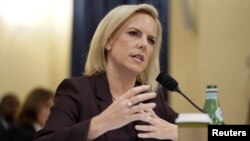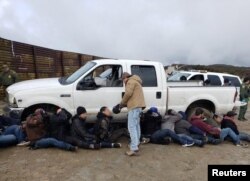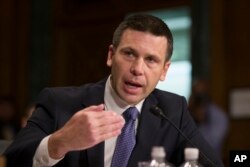Two top U.S. Homeland Security officials defended the Trump administration's border policies on Capitol Hill Wednesday, a day after newly released data showed a spike in the number of undocumented families crossing into the United States.
Homeland Security Secretary Kirstjen Nielsen and Commissioner of U.S. Customs and Border Protection (CBP) Kevin McAleenan faced lawmakers' questions over how arriving asylum-seekers and undocumented migrants are treated in U.S. custody, as well as the extent to which President Donald Trump's declaration of a "national emergency" along the southern U.S. border aligns with the situation on the ground.
"This is not a manufactured' crisis. This is truly an emergency," Nielsen told the House Committee on Homeland Security.
The most recent data from CBP, released Tuesday, shows an uptick in the number of families detained at the border in February.
Last month, CBP detained 76,103 people, one of the highest numbers of apprehensions in a single month in recent years.
Nearly half (36,174) were detained with other relatives. Family units, especially those with underage children, can require special medical care after the arduous border crossing on foot.
WATCH: Democrats Set the Stage for Immigration Fight
House Democrats on Wednesday sharply criticized Nielsen on how migrants and asylum-seekers are being treated at the Mexico border. Republicans largely focused on questions about transnational drug trafficking and its impact on the influx of opioids to the U.S.
Absent from the DHS secretary's responses, however, was any acknowledgment about the broader implications of the agency's policies under the Trump administration on those numbers.
Migration is largely understood to result from "push" and "pull" factors. For example, violence in a Central American country could be interpreted as a "push" toward migration, while seeking to rejoin relatives in the US could be a "pull."
As Nielsen was testifying in one hearing, John V. Kelly, the DHS Inspector General — the agency's internal watchdog office — answered questions before the House Committee on Appropriations' Homeland Security subcommittee.
He said the agency was "not fully prepared to implement the "Zero Tolerance Policy" ordered last year by then-U.S. Attorney General Jeff Sessions, or to deal with its effects, including tracking parents and children separated as a result of that mandatory detention policy.
Kelly also said CBP's "metering" policy, the process of restricting the number of asylum-seekers allowed to enter at ports of entry, may have led to more illegal border crossings.
Commissioner Kevin McAleenan presented a slide show to the Senate Judiciary Committee that highlighted the growing number of groups with at least 100 people in remote areas like the New Mexico Bootheel and Ajo, Arizona, and the unprecedented challenges of attending to medical needs at its short-term holding facilities.
Additionally, a fourth hearing in the House on Wednesday addressed Deferred Action for Childhood Arrivals and Temporary Protected Status — two policies the Trump administration has tried to end or restrict.
The string of testimonies from top officials come before the Senate is expected to vote next week on whether it will reject Trump's national emergency declaration aimed at building border walls, as the House already has.
The Associated Press contributed to this report.










